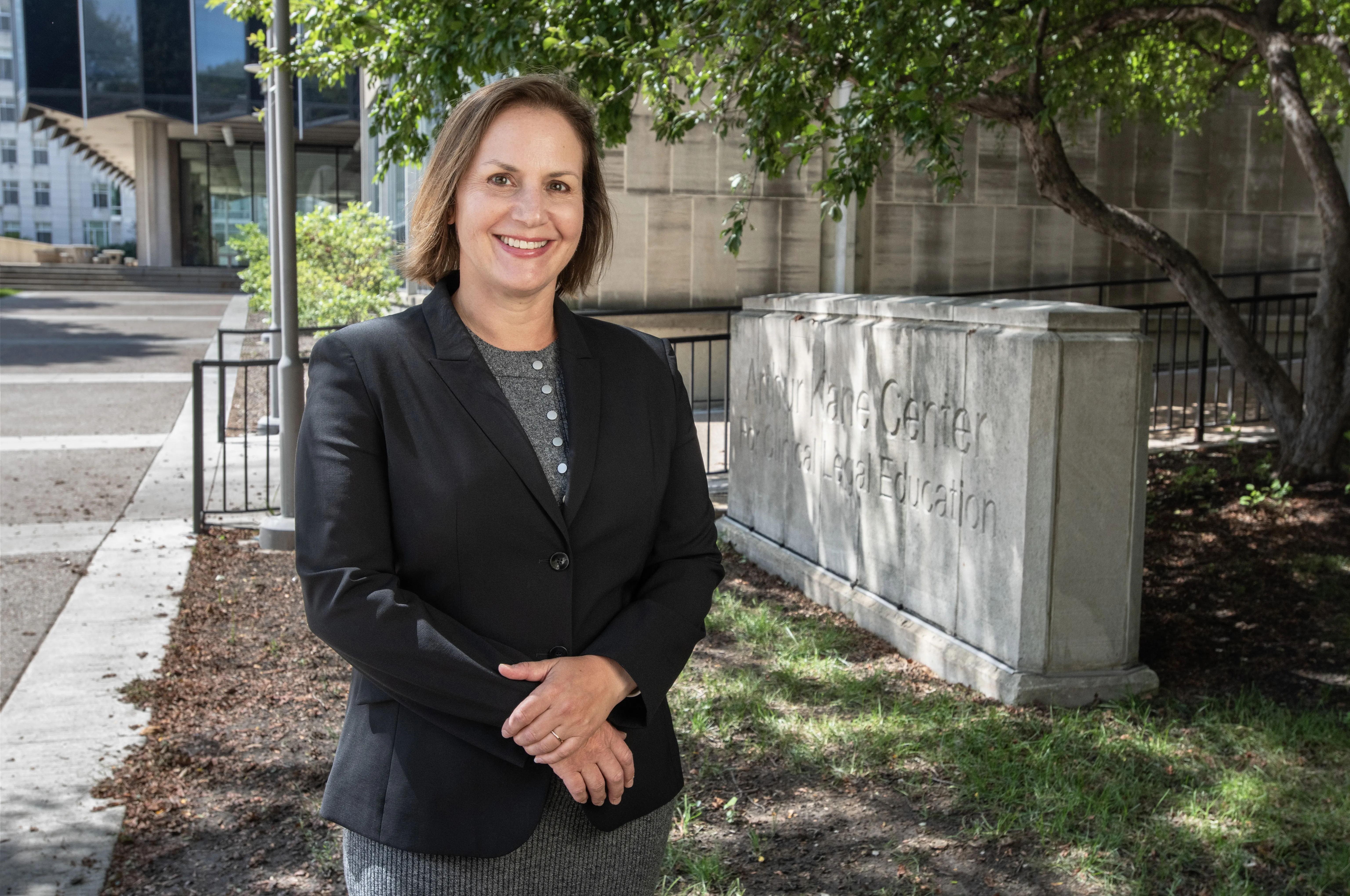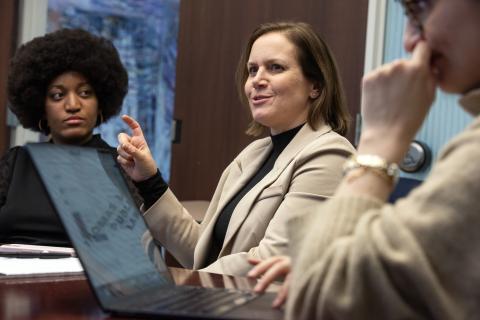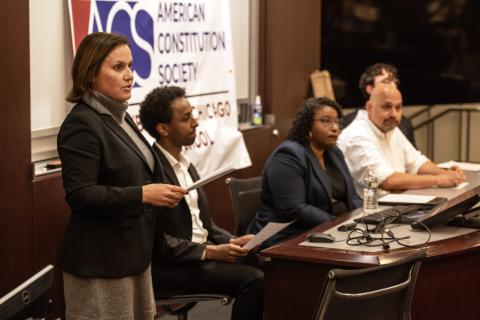At the Helm of the Clinics

On September 1, Clinical Professor Erica Zunkel became director of Clinical and Experiential Learning, overseeing the Law School’s 15 clinics. Zunkel, who is also director of the Criminal and Juvenile Justice Clinic, brings to the position two decades of experience as an advocate and teacher, including more than a dozen years of direct involvement with the Law School’s clinical program. In her new leadership role, Zunkel aims to build on the clinics’ tradition of innovation and impact, including supporting students and faculty, expanding opportunities, and preparing future lawyers to meet the evolving demands of the profession.
How do you feel about taking on this new role?
I couldn’t be more excited to lead the Law School’s clinical program. I am passionate about our clinics and their deeply important role in our law school experience and training. I truly believe that our clinical faculty and students are engaged in the most innovative and impactful work of any clinical program out there.
What do you hope to accomplish in your first year as director?
My overarching goals are to ensure that clinic students, faculty, and staff are well supported, and that the great work happening in our clinics is recognized throughout the Law School, the University, and the broader community. I also want to support Dean Chilton in fundraising for the clinics so that we can grow and expand, enabling us to take on even more complex and impactful work.
How do you see the clinical program evolving over the next few years?
One important thing for us to be thinking about is how the legal profession is changing. I want our clinics to continue to be on the cutting edge, taking advantage of new technologies and resources. As just one example, we need to be teaching our students how to effectively use AI to best help our clients while not compromising teaching the core skills that our students need to be excellent attorneys.
What do you think makes UChicago’s clinical/experiential learning offerings distinct or particularly strong?
In our clinics, we are tackling the toughest cases and legal issues, which challenges our students to think creatively and innovatively. As a result, no matter what field our students choose to pursue after graduation, they gain substantive, hands-on experience that prepares them to be excellent attorneys.
In addition, our clinics entrust students with significant responsibility. In our litigation clinics, students don’t just write legal memos that never see the light of day—they draft motions that are filed and then argued by them in federal and state courts. In our transactional clinics, students meet with stakeholders and draft the agreements that are actually used by the parties.
Overall, our clinics perfectly align with the Law School’s ethos of intellectual rigor, innovation, and meaningful impact, while also preparing our students to meet the ever-evolving demands of the legal profession.
How would you describe your approach to clinical teaching and leadership?
I believe in leading with passion and purpose. I’ve found that students thrive when they are part of a team with a shared purpose and mission, and when they are encouraged to challenge themselves. For me, leadership means serving as a motivator and champion and never asking more of my students than I ask of myself. My students would probably say that I push them hard to do the best work possible on behalf of our clients—but I hope they’d also say that I do so in a supportive way. And we make sure to have fun along the way!
What lessons have you learned from your students?
First, they are fully capable of handling complex, high-stakes cases—and they do so exceptionally well. While some clinical programs opt for students to work on smaller matters, that isn’t the ethos of UChicago’s clinics. For example, a few years ago we had a trial in juvenile court, and my students conducted key direct examinations. They nailed it, and I was incredibly proud—they performed better than the overwhelming majority of practicing lawyers.
Second, my students bring fresh perspectives to our work. Having practiced law for nearly two decades, I sometimes find myself thinking too narrowly. My students consistently remind me to think outside the box and approach problems with creativity and innovation.
The Law School has 15 clinics with a wide range of focuses. What’s the value of having such a diverse set of offerings?
The legal field is incredibly diverse, and we strive to reflect that diversity in our clinics. We recognize that students’ interests are varied, and we want every student who wishes to participate in a clinic to have that opportunity—ideally in a clinic that aligns with their interests and goals. This diversity also allows students to observe and learn from different clinical professors and see different lawyering styles. Personally, participating in a clinic helped me find my own voice and identity as a future lawyer, and I see our students experiencing that same growth.
Clinics also provide different opportunities depending on your goals. If you want to become a stronger writer, you can choose a clinic that offers intensive writing experiences and feedback. If you aim to build confidence in oral advocacy, you can select a clinic that provides the opportunity for in-court experiences. If you’re interested in transactional work, you can participate in a clinic focused on hands-on transactional projects. Whatever your interests and goals, our clinics can help you develop the skills you need.
What role should experiential learning play in a legal education today?
Clinical education is an essential part of legal training. I often compare it to the medical school model—just as it would be unimaginable for doctors to begin practicing without real-world experience during medical school, the same is true for attorneys. Clinics provide law students with the opportunity to learn how to practice law in a supportive environment, where they receive close supervision and mentorship and develop best practices to carry forward into their careers. We are committed to preparing our students to excel from day one—whether they pursue clerkships, roles in public service, or law firm positions—and to instilling an appreciation for the importance of pro bono work in the legal profession.
What drew you to clinical work in the first place—and what keeps you inspired?
During my time at UC-Berkeley Law School, I participated in two different clinics and was inspired by working on behalf of real clients. Participating in clinic helped me get out of my own head and recognize that all the work I was putting into law school had purpose. My clinical supervisor, Professor Elisabeth Semel—co-director of Berkeley Law’s Death Penalty Clinic—was the most influential mentor I had in law school, and she continues to be a guiding force in my career. Her infectious passion for teaching and uncompromising commitment to zealous advocacy helped shape and inspire my own approach to clinical teaching and practice today.
What advice would you offer to a student contemplating enrolling in a law clinic?
Do it! Clinics offer a fantastic opportunity to explore different areas of law and discover what excites you—all under the close supervision of our dedicated clinical faculty, who care deeply about their cases, clients, and students. Clinics will help you become a great attorney, and you’ll experience how collaboration and teamwork make you even better. You’ll also see firsthand how the legal system affects individuals’ lives, and how much impact lawyers can have in the system.
Some prospective students worry about balancing clinic participation with other Law School commitments. From my experience, clinic students successfully manage their time alongside moot court, journals, and other activities, and find fulfillment and satisfaction in all of it.


